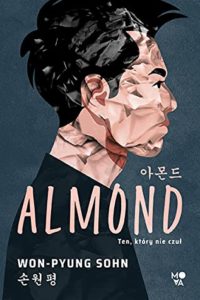As the title of the book references, Soon Yunaje’s brain tonsils are the size of an almond and it is for this reason that the adolescent fails to achieve emotional awareness. Not only does Yunjae have an underdeveloped amygdalar body, his limbic system and frontal lobe fail to communicate fluently. Thus, the young man has enormous difficulties in experiencing feelings like other people. Yunjae cannot understand the implicit meaning of gestures, facial expressions, voice inflections, jokes, double-meaning dialogues and, in particular, he cannot interpret affective states (his own and others’). It should be noted that, etymologically, the term alexithymia, coined by Sifneos, refers to a “lack of words for emotional expression”.

Won-pyung Sohn tells the story of a teenager who cannot connect with himself and consequently cannot connect with the world around him. Given the situation and the grim medical prognosis, Yunjae’s mother and grandmother decide to do everything they can to help the boy learn to communicate with some independence so that he can survive a society that is quick to judge and stigmatize individuals who are different.
Day by day, his devoted caregivers give him lessons on social rules and principles of good behavior so that the young man can relate and adapt to his environment. Routinely, Yunjae must memorize, rehearse, and fake everything that most people learn by mere instinct. His mother and grandmother urge him to fake his own moods and teach him to feign empathy for his peers.
“Even thought my brain was a mess, what kept my soul whole was the warm of the hands holding mine on both sides” Yunjae comments.
Thanks to persistent family efforts, Yunjae learns to blend in with others and to cope in everyday situations. His “false normality” allows him to fit in – not without difficulty – at school. Despite being labeled as a “weird” and “insensitive” kid by his classmates, Yunjae eventually manages to get by in school life. However, the teenager’s world is shattered when his family is the victim of a heinous assault on Christmas Eve. What was supposed to be a beautiful celebration suddenly turns into a nightmare as a mentally unstable man stabs his grandmother to death and beats his mother into a deep coma.
After this tragic incident, Yunjae – lacking in social skills and emotional reactivity – must take responsibility for his future. At this crossroads, the sixteen year old decides to pursue a “normal, ordinary life” in order to honor his mother’s heartfelt wishes. In this way, Yunjae follows the usual routines, keeps up appearances, and takes care of the used book store that his family used to run.
Yunjae’s lonely days are transformed when he starts high school and his path crosses that of Isu Yoon, better known as “Goni”, a violent and volatile teenager who rages against Yunjae and attacks him continuously and viciously at school.
For his part, Goni is a young man who has suffered deep emotional wounds. At a very young age he was separated from his family and was forced to grow up in foster homes, orphanages, and juvenile reform school. After thirteen years in the public foster care system, the teenager learns a delicate and unexpected truth: his legitimate family never abandoned him to his fate. From the moment of his disappearance, his parents fought relentlessly to get him back. Hurt, overwhelmed and filled with dark resentment, Goni tries to reintegrate into a home that seem alien, distant, and impossible for him.
Against all odds, the boisterous tormentor and the inexpressive victim develop an unusual bond. Both outcasts, loners, and misfits, they strike up a peculiar and unlikely friendship. As these “monsters” learn about each other, they also begin to discover more of their own identity. In this sense, the book Almond develops a bold contrast between the boy who is doomed to inner emptiness and the boy who is doomed to heartbreaking sensitivity.
From interactions with Goni, Yunjae begins to ask new questions about the world and human interaction. Although genetics continue to limit his emotional-processing ability, something tiny is stirring inside him. Gradually, the boy with frozen feelings gives in to curiosity and even illusion.
“I turned off the light and breathed in the book smell that still lingered. It was as familiar as the background surrounding me. But I noticed something slightly different carried on the scent. Suddenly a small ember was rekindled in my heart. I wanted to read between the lines. I wanted to be someone who truly understood the meaning of an author’s words. I wanted to know more people, to be able to engage in deep conversations, and to learn what it was to be human” Yunjae admits in a revealing passage.
Nevertheless, everything is brutally precipitated when Goni escapes from his family and puts his life at risk. Perhaps out of fear, perhaps out of love, Yunjae decides to intervene and help his friend. Be that as it may, the boy who does not know how to feel awakens to his own instinct and will do everything possible to rescue Goni not only from the danger that threatens him, but also from his own violence.
Almond is a lacerating novel about the strength of friendship, the power of emotions, and the urgent need to live with more empathy and compassion. With shattering questions and insightful comments, the author invites us to become aware of alexithymia and urges us to demolish social prejudices.
Although the novel may belong to the Young Adult genre, the story goes beyond this editorial label and could appeal to a variety of audiences. Won-pyung Sohn’s pen is remarkably nimble and witty, the writer has a fine acuity to shake and conquer the reader. Almond is one of those rare exceptions that provokes rereading.
Almond won the Changbi Award for Young People’s Literature, was well received by critics and quickly became a bestseller.
Image credit: Aaron Burden

